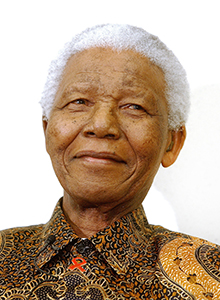Nelson Mandela, South African leader, dies at 95

Nelson Mandela, former president of South Africa and recipient of the Nobel Peace Prize, delivers remarks at a program in Washington, D.C., in this file photo from May 16, 2005. Mandela died on Thursday, Dec. 5, 2013. (Olivier Douliery/Abaca Press/MCT)
JOHANNESBURG — Nelson Mandela, who became one of the world’s most beloved statesmen and a colossus of the 20th century when he emerged from 27 years in prison to negotiate an end to white minority rule in South Africa, has died. He was 95.
South African President Jacob Zuma made the announcement at a news conference late Thursday, saying “we’ve lost our greatest son.”
His death closed the final chapter in South Africa’s struggle to cast off apartheid, leaving the world with indelible memories of a man of astonishing grace and good humor. Rock concerts celebrated his birthday. Hollywood stars glorified him on screen. And his regal bearing, graying hair and raspy voice made him instantly recognizable across the globe.
As South Africa’s first black president, the ex-boxer, lawyer and prisoner No. 46664 paved the way to racial reconciliation with well-chosen gestures of forgiveness. He lunched with the prosecutor who sent him to jail, sang the apartheid-era Afrikaans anthem at his inauguration, and traveled hundreds of miles to have tea with the widow of Hendrik Verwoerd, the prime minister at the time he was imprisoned.
His most memorable gesture came when he strode onto the field before the 1995 Rugby World Cup final in Johannesburg. When he came on the field in South African colors to congratulate the victorious South African team, he brought the overwhelmingly white crowd of 63,000 to its feet, chanting “Nelson! Nelson! Nelson!”
For he had marched headlong into a bastion of white Afrikanerdom — the temple of South African rugby — and made its followers feel they belonged in the new South Africa.
Nelson Rolihlahla Mandela was born July 18, 1918, the son of a tribal chief in Transkei, one of the future “Bantustans,” independent republics set up by the apartheid regime to cement the separation of whites and blacks.
Mandela’s royal upbringing gave him a dignified bearing that became his hallmark. Many South Africans of all races would later call him by his clan name, Madiba, as a token of affection and respect.
Growing up at a time when virtually all of Africa was under European colonial rule, Mandela attended Methodist schools before being admitted to the black University of Fort Hare in 1938. He was expelled two years later for his role in a student strike.
He moved to Johannesburg and worked as a policeman at a gold mine, boxed as an amateur heavyweight and studied law.
His first wife, nurse Evelyn Mase, bore him four children. A daughter died in infancy, a son was killed in a car crash in 1970 and another son died of AIDS in 2005. The couple divorced in 1957 and Evelyn died in 2004.
Mandela began his rise through the anti-apartheid movement in 1944, when he helped form the ANC Youth League.
He organized a campaign in 1952 to encourage defiance of laws that segregated schools, marriage, housing and job opportunities. The government retaliated by barring him from attending gatherings and leaving Johannesburg, the first of many “banning” orders he was to endure.
He was arrested in 1962 and sentenced to five years’ hard labor for leaving the country illegally and inciting blacks to strike.
A year later, police uncovered the ANC’s underground headquarters on a farm near Johannesburg and seized documents outlining plans for a guerrilla campaign. At a time when African colonies were one by one becoming independent states, Mandela and seven co-defendants were sentenced to life in prison.
“I do not deny that I planned sabotage,” he told the court. “I did not plan it in a spirit of recklessness, nor because I have any love of violence. I planned it as a result of a calm and sober assessment of the political situation that had arisen after years of tyranny, exploitation and oppression of my people by whites.”
On Feb. 11, 1990, inmate No. 46664, who had once been refused permission to leave prison for his mother’s funeral, went free and walked hand-in-hand with Winnie, his wife. Blacks across the country erupted in joy — as did many whites.
Mandela took charge of the ANC, shared the 1993 Nobel Peace Prize with de Klerk and was elected president by a landslide in South Africa’s first all-race election the following year.
With his fellow Nobelist, Archbishop Desmond Tutu, he set up the Truth and Reconciliation Commission, which allowed human rights offenders of all races to admit their crimes publicly in return for lenient treatment. It proved to be a kind of national therapy that would become a model for other countries emerging from prolonged strife.
He increasingly left the governing to Deputy President Thabo Mbeki, who took over when Mandela’s term ended in June 1999 and he declined to seek another — a rarity among African presidents.
“I must step down while there are one or two people who admire me,” Mandela joked at the time. When he retired, he said he was going to stand on a street with a sign that said: “Unemployed, no job. New wife and large family to support.”
His marriage to Winnie had fallen apart after his release and he was now married to Graca Machel, the widowed former first lady of neighboring Mozambique.
He is survived by Machel; his daughter Makaziwe by his first marriage, and daughters Zindzi and Zenani by his second.
— Christopher Torchia, Associated Press


